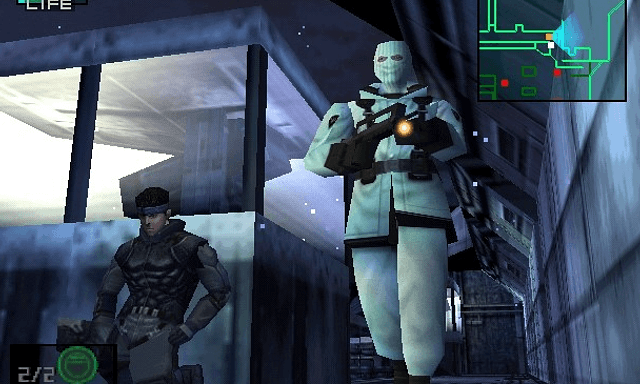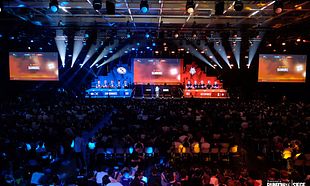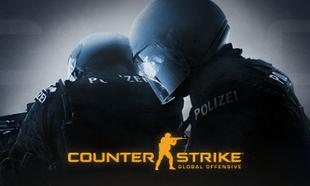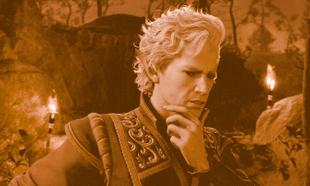To mark 25 years of entertainment.ie, we are running down the 25 biggest video games of the sites lifetime, from triple AAA blockbusters to indie games that made the biggest splash - we're starting with 1999's 'Metal Gear Solid'
A lot has happened from 1997 until 2022; gaming went from a niche part past time to a billion-Euro industry, 3D graphics now approach movie quality and multiplayer has become the de jure gameplay mode for most titles.
Over the course of 2022 we'll be taking a look at the 25 biggest games of our lifetime, and we're going back to 1999 for the first game: 'Metal Gear Solid' for the PlayStation One.
Grab your bandana and codec, we're paying a visit to Shadow Moses.
Auteur Theory
In the world of video games, the auteur is a fairly new development.
The world of film had auteurs since the 1960's thanks to Messrs Godard and Truffaut, television had Michael Mann define the role of a showrunner with 'Miami Vice' in the 1980s, but it took until the turn of the millennium for the auteur to cement a grip on the gaming industry.
For lack of a better word, Hideo Kojima is a film obsessive.
His Twitter bio states "70% of my body is movies" and with his games, the influence is evident.
The original 'Metal Gear Solid' is as much a tribute to the world of cinema as much as it is a landmark moment in gaming history.
References to Kubrick, Carpenter and Jodorowsky are dotted through the first game, and a game taking direct influence from the film auteur sphere was something that had never been done in the gaming sphere prior to the original 'Metal Gear Solid'.
Games of the 1990s were relatively simple affairs where simplicity was key (the pick-up-and-play no-frills fun of 'Street Fighter', 'Mario Kart' and 'Contra' can attest to that) but very few games were pushing the medium of video games forward as an art form with regards to narrative.
The original 'Metal Gear Solid' has a fairly standard action film plot on the surface - terrorists have taken over a government facility in search of nuclear weapons and it's up to an action hero to take care of the problem - but where 'Metal Gear Solid' pushed the medium forward was its philosophical bent.
Shortly after the release of the original 'Metal Gear Solid', 'The Matrix' proved that you could mix high-octane popcorn action with philosophy.
'Metal Gear Solid' explored topics such as the very nature of identity, the meaning of war and genetics.
Readers who've played triple AAA titles over the last decade will know that tackling big themes is nothing new - 'The Last Of Us' games tackle grief and trauma for example - but 'Metal Gear Solid' and its subsequent success made it hip and cool for developers to broach more mature and complex topics in their games.
Fourth Wall Demolition Derby
Meta narratives and fourth wall breaking are risky elements to introduce to any form of entertainment, but Hideo Kojima took a sledgehammer and demolished the fourth wall with the original 'Metal Gear Solid'.
Kojima's decision to put a hidden codec frequency on the box that was crucial to progressing in the game was a genuinely clever outside-the-box trick, but to Irish gamers, this was a source of frustration.
XtraVision didn't allow you to bring the original game case home with you, instead, the game rental was given to you in an Xtravision box.
Through second-hand recollection, this writer has heard of at least three people who couldn't progress through the game for that exact reason, and it wasn't until the advent of the internet they could progress in the game.
The battle with Psycho Mantis where he reads the contents of the player's memory card is another groundbreaking development in the field of video games, and even writing about it 20 years after the fact makes you realise how cutting edge this was in 1999.
A 2022 analogue would be a character in a Netflix film addressing the audience and stopping the action to praise or criticise the viewer on their choice of films watched.
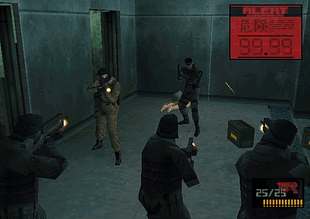
When all is said and done and the book on video games is written, Hideo Kojima will be seen as influential a figure in gaming as Sergei Eisenstein or Cecil B. Demille are to the landscape of cinema.
Prior to 'Metal Gear Solid', Kojima had a strong cult following, with 'Snatcher' garnering strong critical praise and a substantial cult following for its 'Blade Runner' inspired aesthetic and deep thematic elements.
To bring it back to film, 'Snatcher' serves as an analogue to Christopher Nolan's 'Momento' or 'Insomnia', proof of concepts that the auteurs behind them are ready for the big leagues.
It's fair to say that the original 'Metal Gear Solid' had as big an impact on the world of gaming as 'The Dark Knight' had on modern cinema.
"Huh? Whose footprints are those?"
Think of any third-person action game you've played over the last 20 years and how many have elements of stealth involved.
2018's 'Spider-Man' was rightfully a killer app for the PlayStation 4, but you'll be hard-pressed to find anyone who will tell you that the stealth segments were the highlight of that game.
Nearly 20 years and 3 console generations later, 'Spider-Man' couldn't get right what 'Metal Gear Solid' did flawlessly on the PlayStation 1.
The 'Metal Gear Solid' experience is hard to replicate in film or television; the sense of anxiety and fear when sneaking around and trying not to be caught is something that can only be done in video game form.
Learning the guards' routes, knowing where the cameras are located and keeping an eye on the radar is crucial to success in 'Metal Gear Solid'.
Players could approach the game like 'Rambo' and mow down enemies, but a truly skilled player would never let their presence be felt.
Over 20 years later, the tension of hiding in a cardboard box and waiting to see if a guard has blown your cover still remains one of the tensest experiences in gaming.
Later games in the series pushed certain elements further such as 2005's 'Snake Eater' making eating food and treating wounds a crucial part of the gameplay or 2015's 'The Phantom Pain' allowing you to sneak up on enemies and bring them back to your base, but with the technical limitations of the PlayStation One, Kojima had to get creative.
The late 1990's was an exceptionally strong time for gaming, with the likes of 'Half-Life', 'Resident Evil 2' 'Goldeneye 007' and 'Gran Turismo' selling millions of copies between them, but only one game had the courage and conviction to make the players switch the controller into a different port to beat a boss character.
